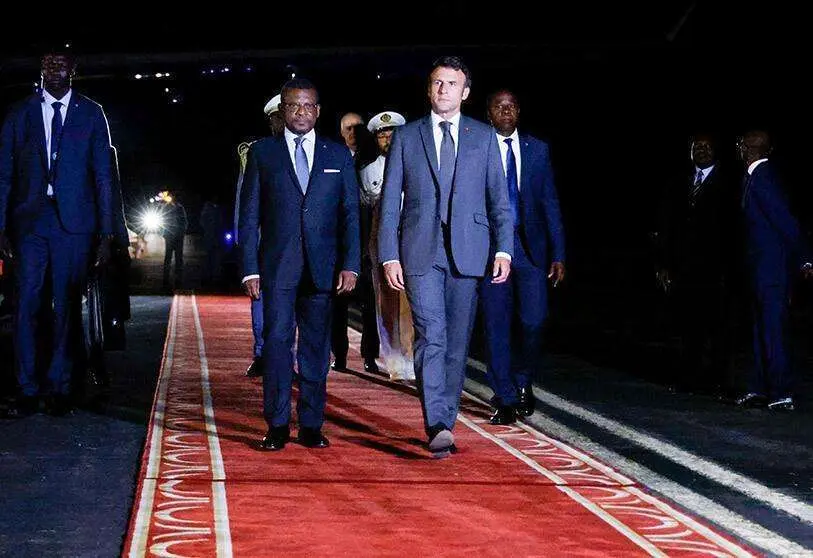France reshuffles its pieces to contain Wagner's Sahel advance

In 2013, former French president François Hollande deployed his troops to contain the jihadist advance in Mali, which threatened to turn the country into a failed state. The well-known Operation Serval prevented 'in extremis' Bamako from falling into insurgent hands and destabilising the rest of the Sahel, Europe's southern border. Today, almost a decade later, the situation is not much better. With terrorist groups at the gates of Bamako and scattered across the region, France has ceased to have a presence in Mali to the detriment of actors such as the Kremlin-linked Wagner group, following the consolidation in power of the military junta led by Assimi Goita. The West has lost a key enclave for controlling the jihadist threat.
The reorganisation of forces announced a year ago by the Elysée Palace's Emmanuel Macron, criticism of the Malian military establishment from Paris, and the exploitation by the National Transitional Council (CNT) of the growing anti-French sentiment that has arisen due to the lack of visible results after nine years of military presence, ended up unravelling bilateral relations between France and Mali, and led to the expulsion of the French ambassador in Bamako, Joël Meyer. As long as Colonel Goita and the military leadership remain in power, it seems unlikely that the French and Western authorities as a whole will return.
The last stronghold of Operation Barkhane, the successor to Serval, and the military operations attached to it, also left Mali at the demand of the Bamako authorities. As the latter withdrew, Wagner's Russian mercenaries landed. "The new authorities, under the adrenalin of a relentless and almost blind populism and pan-Africanism, have made the mistake of shamefully pushing away the historical partner, France, which has a better command of the terrain and sufficient means to fight terrorism, to promote an agreement with Caucasians who are used to the cold, who have no mastery of the Sahel, and who are barbaric and ill-disciplined when it comes to confronting the terrorism that is already ravaging the country", Malian consultant Oumalha Haïdara tells Atalayar.

In the aftermath of the coup, Paris is trying to reinvent its strategy and reinvent itself abroad. Often described as 'France's Afghanistan', the Sahel has proved an unfertile ground for its strategies, which have been criticised for being reduced to an excessively militaristic vision. The extensive list of European and regional initiatives promoted by the Elysée has not worked either. Haïdara explains that "things should have happened differently": "First of all, they should have won the confidence of the population - especially in rural areas - through concrete actions to secure people and their property, to discipline soldiers to respect international humanitarian law and human rights during operations, to review military agreements with the various partners, especially France, to correct and amend deficiencies".
In any case, Russia has been able to exploit these shortcomings by reaching agreements with the military junta in Bamako. In September, Reuters reported on a deal between the Malian transitional government and the private military company Wagner, headed by oligarch Yevgeny Prigozhin, known as 'Putin's Chef', under which the PMC would deploy a contingent of 1,000 mercenaries in the country to train its forces and protect senior army commanders. In exchange, the Malian junta granted Wagner access to and exploitation of its natural resources. The news, confirmed days later, triggered an earthquake in the Sahel.
Months earlier, Macron had halved the number of troops deployed in Mali from 5,100 to around 2,500, a move interpreted as a lack of commitment. With Moscow on the playing field, the re-elected French president wants to make a strong presence in the region and strengthen cooperation with his neighbours. At all costs, he wants to prevent more states from opting for the Malian way and ending up hiring Wagner's services, as has been rumoured in Burkina Faso following the January coup d'état led by Lieutenant General Damiba. The Elysée is eyeing two enclaves: Chad and Niger.

Chad has been a "privileged" historical partner for the past three decades under the presidency of the late Idriss Déby, who was killed a year ago on the battlefield, according to the official version of the event. His son, heir to the Chadian throne through a semi-coup d'état, represents a continuation of his legacy. With N'Djamena there are no problems. Niger's strategy has become a model of success in the face of serious regional problems. "Niger is fortunate to be governed by legitimate authorities and is therefore not going through a political crisis, which is favourable for the country's context," Haïdara told this newspaper.
The withdrawal of the Barkhane force from Mali and its arrival in Niger will benefit Niger, provided that the Nigerien authorities take advantage of the lessons learned from the French presence in Mali to avoid a repetition of the same events in that country," says the Malian consultant. In an interview with this newspaper, France's former ambassador to Mali, Nicolas Normand, recognised N'Djamena and Niamey as "the main partners" of Paris in the Sahel.
But France's strategic redefinition includes other enclaves to confront jihadist proliferation: the area around Lake Chad and the Gulf of Guinea, the two new hotspots in the region beyond the triple border shared by Burkina Faso, Mali and Niger. It was with this plan in mind that Macron embarked on his regional tour of West Africa a fortnight ago, which took him to Cameroon, Benin and Guinea-Bissau. But jihadist radicalisation is no longer the only threat, but also the presence of Russia in the Sahel, an actor that not only intervenes directly, but also through tools outside international legality such as Wagner, which is involved in human rights atrocities in Mali and other countries on the continent.








